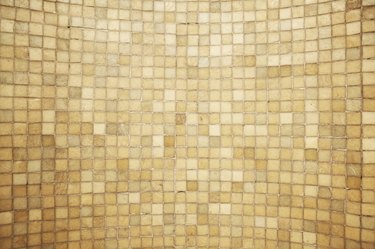Things You'll Need
Notched trowel
Tile wet saw
Rubbing stone
Old towel
Thinset mortar
Grout float
Safety glasses
Tile spacers

The normal application of tile on vertical surfaces is straight walls that are plumb. However, occasionally you will find yourself designing elements or moving into a new home that already has the design finished where a curved wall section needs to be covered with tile. A common example of curved wall tiles is the faces of Jacuzzi surrounds or specially designed bathrooms. While the normal way of curving wall tile in this instance is to use 1-inch tiles on a sheet, you can also modify larger tiles to work in the same fashion.
Step 1
Install sheet tile as normal to curve it around a wall. Sheets of 1- or 2-inch tiles will easily bend and fold around inside and outside corners. Spread thinset on the wall with the notched trowel and press the sheets into the thinset. Work your way from the bottom up and use a grout float to tamp the tile firmly into the thinset mortar.
Video of the Day
Step 2
Prepare larger tiles to work with the curvature of the wall. Set the gauge on the tile wet saw and cut several strips at 3 inches in width. Check those pieces against the wall to see if your curve is gentle enough to accommodate the width of your pieces. You want the tile to be just wide enough to make the curve with the majority of the backside of the tile having contact with the wall for mortar adhesion.
Step 3
Adjust the size of the strips accordingly. Remember that inside curves will fold the tiles against each other, and outside corners away from each other, which affects the size of the grout joint. A gentle curve may use 6-inch strips, while a sharp curve may require your strips cut down to 1 inch for complete mortar adhesion.
Step 4
Cut your pieces of tile on the wet saw. Stone the cut edges with a rubbing stone and dry each piece off completely with an old towel. Install the pieces as normal. Work your way from the bottom of the wall up. Spread thinset on the wall with a notched trowel and place the strips of tile into the thinset. Use tile spacers between them to help guide your grout joint width.
Tip
A typical 12-by-12 inch tile requires a 3/8-inch notched trowel. Larger tiles will require a larger notch, and smaller tiles smaller notches. Tile spacers come in a variety of widths; choose them depending upon how wide you want your grout joints to be.
Warning
Always wear safety glasses when operating a tile saw.
Video of the Day